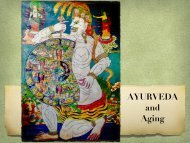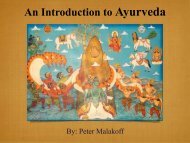How Thoreau's Walden Pond Mixed with the Ganges and Yoga Came to America with Swami Vivekananda
One early morning in 1846, during the coldest days of a New England winter, Henry David Thoreau looked out the window of his small cabin on Walden Pond and saw men cutting its ice into blocks. That ice was hauled by horse to a railroad that ran across the western edge of Walden Pond, packed into a boxcar, taken to Boston and loaded onto a clipper ship that sailed to Calcutta, India, arriving about four months later. Once there, that ice was purchased by grateful members of the East India Company. Thoreau had witnessed a small part of the global ice trade between New England and India that took place during the latter part of the nineteenth century. When Thoreau considered the ice trade, his vision sailed on metaphors far beyond the scope of business. The waters he imagined flowed both east and west and carried not just natural elements, but culture, religion and philosophy as well. He envisioned that after arriving in Calcutta, the New England ice of Walden Pond would eventually melt and run downhill where it would join with the sacred water of the Ganges. He wrote in Walden: "It appears that the sweltering inhabitants of Charleston and New Orleans, of Madras and Bombay and , drink at my well. In the morning I bathe my intellect in the stupendous and cosmogonal philosophy of the , since whose composition years of the gods have elapsed, and in comparison with which our modern world and its literature seem puny and trivial; and I doubt if that philosophy is not to be referred to a previous state of existence, so remote is its sublimity from our conceptions. I lay down the book [Bhagavad-Gita] and go to my well for water, and lo! there I meet the servant of the Bramin, priest of and and who still sits in his temple on the Ganges reading the , or dwells at the root of a tree with his crust and water jug. I meet his servant come to draw water for his master, and our buckets as it were grate together in the same well. The pure Walden water is mingled with the sacred water of the Ganges." This book tells the story of these waters . . .
One early morning in 1846, during the coldest days of a New England winter, Henry David Thoreau looked out the window of his small cabin on Walden Pond and saw men cutting its ice into blocks. That ice was hauled by horse to a railroad that ran across the western edge of Walden Pond, packed into a boxcar, taken to Boston and loaded onto a clipper ship that sailed to Calcutta, India, arriving about four months later. Once there, that ice was purchased by grateful members of the East India Company. Thoreau had witnessed a small part of the global ice trade between New England and India that took place during the latter part of the nineteenth century.
When Thoreau considered the ice trade, his vision sailed on metaphors far beyond the scope of business. The waters he imagined flowed both east and west and carried not just natural elements, but culture, religion and philosophy as well. He envisioned that after arriving in Calcutta, the New England ice of Walden Pond would eventually melt and run downhill where it would join with the sacred water of the Ganges. He wrote in Walden: "It appears that the sweltering inhabitants of Charleston and New Orleans, of Madras and Bombay and , drink at my well. In the morning I bathe my intellect in the stupendous and cosmogonal philosophy of the , since whose composition years of the gods have elapsed, and in comparison with which our modern world and its literature seem puny and trivial; and I doubt if that philosophy is not to be referred to a previous state of existence, so remote is its sublimity from our conceptions.
I lay down the book [Bhagavad-Gita] and go to my well for water, and lo! there I meet the servant of the Bramin, priest of and and who still sits in his temple on the Ganges reading the , or dwells at the root of a tree with his crust and water jug. I meet his servant come to draw water for his master, and our buckets as it were grate together in the same well. The pure Walden water is mingled with the sacred water of the Ganges."
This book tells the story of these waters . . .
Create successful ePaper yourself
Turn your PDF publications into a flip-book with our unique Google optimized e-Paper software.
“When I did at last return <strong>to</strong> normal consciousness I felt<br />
convinced that <strong>the</strong> state I had been in was a revelation of nondualistic<br />
experience. So <strong>the</strong>n I knew that what is written in <strong>the</strong><br />
Scriptures about <strong>the</strong> experience is all true." Even when<br />
Ramakrishna was dying from throat cancer, Narendra silently<br />
thought <strong>to</strong> himself, "If Ramakrishna is really an Avatar or<br />
incarnation of God, let him tell me so now." Slowly opening his eyes<br />
<strong>and</strong> looking up from his bed, Ramakrishna gazed directly at<br />
Narendra. Then, speaking <strong>with</strong> great difficulty, he said, "That One<br />
who was Rama <strong>and</strong> Krishna is Ramakrishna."<br />
– Ramakrishna <strong>and</strong> his Disciples by Chris<strong>to</strong>pher Isherwood.<br />
Before his death in 1886, Ramakrishna called Narendra <strong>to</strong> his bedside. He<br />
looked at his disciple <strong>and</strong> entered in<strong>to</strong> samadhi. Narendra felt a force enter<br />
in<strong>to</strong> him <strong>and</strong> he lost consciousness. When he awoke, Ramakrishna said, "I<br />
have given you everything I possess, now I am no more than a Fakir, a<br />
penniless beggar. By <strong>the</strong> powers that I have given you, you will shake <strong>the</strong> world<br />
<strong>with</strong> your intellect <strong>and</strong> spiritual power. Not until <strong>the</strong>n will you return <strong>to</strong> <strong>the</strong><br />
source from which you came." Although rare, this complete transmission of<br />
spiritual force from guru <strong>to</strong> disciple has occurred before in Indian spiritual<br />
his<strong>to</strong>ry. It is <strong>the</strong> <strong>to</strong>tal gift of <strong>the</strong> accumulated fruits of a teacher's life <strong>and</strong><br />
spiritual Realization. Ramakrishna had poured all his spiritual power in<strong>to</strong><br />
Narendra <strong>and</strong> chose him <strong>to</strong> be his spiritual successor.<br />
Vivekan<strong>and</strong>a (in center seated) <strong>with</strong> bro<strong>the</strong>r monks<br />
Calcutta – 1899<br />
50


















